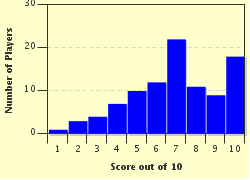Quiz Answer Key and Fun Facts
1. The Royal Library was one of the most important libraries of the ancient world. Where in Egypt was it located?
2. To whom was the Royal Library in Egypt dedicated?
3. Which ruler of ancient Egypt provided for the establishment of the Royal Library?
4. The Royal Library was part of a larger research facility in ancient Egypt. What was the entire facility called?
5. In what form was the majority of the knowledge kept at the Royal Library in Egypt?
6. Which of the following was NOT a way that information was collected at the Royal Library in Egypt?
7. Many of the greatest intellectuals of the day studied at the Royal Library in Egypt. One is known as the father of geometry; the other the father of engineering. Who were these great intellectuals?
8. There are many theories concerning the destruction of the Royal Library in Egypt. One claims it was burned during a civil war, which was brought to Egypt in 48 BC. Who was involved in this civil war?
9. Another theory concerning the destruction of the Royal Library in Egypt is that it was closed by Emperor Theodosius I in 391. For what reason would it have been closed at that time?
10. There is also a theory that the Royal Library was closed in 642. Which leader is believed to have said, "If those books are in agreement with the Quran, we have no need of them; and if these are opposed to the Quran, destroy them."?
Source: Author
ponycargirl
This quiz was reviewed by FunTrivia editor
bloomsby before going online.
Any errors found in FunTrivia content are routinely corrected through our feedback system.

